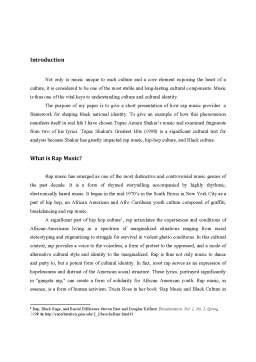Cuprins
- Introduction 2
- What is Rap Music? 2
- Black Shame versus Pride 2
- Lyrics Analysis 2
- Conclusion 2
- Sources 2
Extras din proiect
Introduction
Not only is music unique to each culture and a core element exposing the heart of a culture, it is considered to be one of the most stable and long-lasting cultural components. Music is thus one of the vital keys to understanding culture and cultural identity.
The purpose of my paper is to give a short presentation of how rap music provides a framework for shaping black national identity. To give an example of how this phenomenon manifests itself in real life I have chosen Tupac Amaru Shakur’s music and examined fragments from two of his lyrics. Tupac Shakur's Greatest Hits (1998) is a significant cultural text for analysis because Shakur has greatly impacted rap music, hip-hop culture, and Black culture.
What is Rap Music?
Rap music has emerged as one of the most distinctive and controversial music genres of the past decade. It is a form of rhymed storytelling accompanied by highly rhythmic, electronically based music. It began in the mid 1970’s in the South Bronx in New York City as a part of hip hop, an African American and Afro Carribean youth culture composed of graffiti, breakdancing and rap music.
A significant part of hip hop culture , rap articulates the experiences and conditions of African-Americans living in a spectrum of marginalized situations ranging from racial stereotyping and stigmatizing to struggle for survival in violent ghetto conditions. In this cultural context, rap provides a voice to the voiceless, a form of protest to the oppressed, and a mode of alternative cultural style and identity to the marginalized. Rap is thus not only music to dance and party to, but a potent form of cultural identity. In fact, most rap serves as an expression of hopelessness and distrust of the American social structure. These lyrics, portrayed significantly in "gangsta rap," can create a form of solidarity for African American youth. Rap music, in essence, is a form of human activism. Tricia Rose in her book ‘Rap Music and Black Culture in Contemporary America’ defines rap music as a “black cultural expression that prioritizes black voices from the margins of urban America”.
Rap music can be described as the reality of black urban life, or “authentic” black. Some sociologists argue that rap music has undermined black cultural integrity while others defend rap as the voice of ghetto youth. The latter group of scholars believes that the content of rap music teaches values that are needed for life in the ghetto because it comes from rappers who have experienced the life firsthand. The violent nature of different forms of rap music is not to be taken literally and it is often the case that analysis is unnecessary because the lyrics are created for entertainment. For many however, rap music serves as the authentic voice to black urban youth.
Black Shame versus Pride
In the past white Americans have forced African Americans to don masks which conceal their true identity, Michael Jackson is an outstanding example here. The apparent transformation of his racial features through violence of surgery has been interpreted by some as the bizarre expression of a desire to achieve fame by ‘becoming white’.
Tupac Shakur (2Pac) stands on the other side of the scale as the embodiment of ‘black pride’. He was a renown American rapper and in addition to his status as a top-selling recording artist, Shakur was a successful film actor and a prominent social activist reaffirming African American cultural values.
One of the most important reasons for Tupac's staying power in contemporary rap music is how he boldly addresses the question of authentic black identity. One of the most well-known mantras in hip-hop culture is to "keep it real." In other words, one must tell the truth about life as one lives it. Further, one must remain aware of the most important features that uniquely define black culture.
Preview document
Conținut arhivă zip
- Expressing Black Cultural Identity.doc










